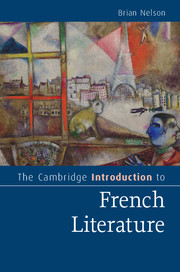Book contents
- Frontmatter
- Dedication
- Contents
- Preface
- Acknowledgements
- Chronology
- 1 Villon: a dying man
- 2 Rabelais: the uses of laughter
- 3 Montaigne: self-portrait
- 4 Corneille: heroes and kings
- 5 Racine: in the labyrinth
- 6 Molière: new forms of comedy
- 7 La Fontaine: the power of fables/fables of power
- 8 Madame de Lafayette: the birth of the modern novel
- 9 Voltaire: the case for tolerance
- 10 Rousseau: man of feeling
- 11 Diderot: the enlightened sceptic
- 12 Laclos: dangerous liaisons
- 13 Stendhal: the pursuit of happiness
- 14 Balzac: ‘All is true’
- 15 Hugo: the divine stenographer
- 16 Baudelaire: the streets of Paris
- 17 Flaubert: the narrator vanishes
- 18 Zola: the poetry of the real
- 19 Huysmans: against nature
- 20 Mallarmé: the magic of words
- 21 Rimbaud: somebody else
- 22 Proust: the self, time and art
- 23 Jarry: the art of provocation
- 24 Apollinaire: impresario of the new
- 25 Breton … Company: Surrealism
- 26 Céline: night journey
- 27 Sartre: writing in the world
- 28 Camus: a moral voice
- 29 Beckett: filling the silence
- 30 French literature into the twenty-first century
- Notes
- Further reading
- Index of authors and titles
- Index of genres, movements and concepts
- Cambridge Introductions to …
- References
9 - Voltaire: the case for tolerance
Published online by Cambridge University Press: 05 July 2015
- Frontmatter
- Dedication
- Contents
- Preface
- Acknowledgements
- Chronology
- 1 Villon: a dying man
- 2 Rabelais: the uses of laughter
- 3 Montaigne: self-portrait
- 4 Corneille: heroes and kings
- 5 Racine: in the labyrinth
- 6 Molière: new forms of comedy
- 7 La Fontaine: the power of fables/fables of power
- 8 Madame de Lafayette: the birth of the modern novel
- 9 Voltaire: the case for tolerance
- 10 Rousseau: man of feeling
- 11 Diderot: the enlightened sceptic
- 12 Laclos: dangerous liaisons
- 13 Stendhal: the pursuit of happiness
- 14 Balzac: ‘All is true’
- 15 Hugo: the divine stenographer
- 16 Baudelaire: the streets of Paris
- 17 Flaubert: the narrator vanishes
- 18 Zola: the poetry of the real
- 19 Huysmans: against nature
- 20 Mallarmé: the magic of words
- 21 Rimbaud: somebody else
- 22 Proust: the self, time and art
- 23 Jarry: the art of provocation
- 24 Apollinaire: impresario of the new
- 25 Breton … Company: Surrealism
- 26 Céline: night journey
- 27 Sartre: writing in the world
- 28 Camus: a moral voice
- 29 Beckett: filling the silence
- 30 French literature into the twenty-first century
- Notes
- Further reading
- Index of authors and titles
- Index of genres, movements and concepts
- Cambridge Introductions to …
- References
Summary
I have never made but one prayer to God, and a very short one:
‘O Lord, make my enemies ridiculous.’
And God granted it.
– Voltaire, Letter to Étienne Noël Damilaville, 16 May 1767‘Voltaire is the central figure of the Enlightenment, because he accepted its basic principles and used all his incomparable wit and energy and literary skill and brilliant malice to propagate these principles and spread havoc in the enemy's camp. Ridicule kills more surely than savage indignation: and Voltaire probably did more for the triumph of civilized values than any writer who ever lived.’ Thus wrote Isaiah Berlin, the distinguished thinker and historian of ideas. François-Marie Arouet, better known under his pseudonym Voltaire (1694– 1778), has a special place in French literature because of his commitment to secular, humanist values and his defence of intellectual freedom in a society dominated by the Church.
Voltaire first made his name as a writer of verse tragedies and epic poems, but his true genius emerged as the master of brief forms: the short story, the essay, the treatise, the pamphlet, the letter, the epigram. The epigrams, some of which have passed into common use, give a good idea of the style and spirit of Voltaire:
If God did not exist, it would be necessary to invent him.
If God made us in his image, we have certainly returned the compliment.
There are two things for which animals are to be envied: they know nothing of future evils, or of what people say about them.
Prejudice is the reason of fools.
It is dangerous to be right in matters on which the established authorities are wrong.
Voltaire's wit and irony were the weapons he used in his unrelenting struggle against the abuses of the Ancien Régime: obscurantism, intolerance, religious fanaticism. He courted controversy, he made enemies all his life, his books were censored and burnt. His rallying cry, launched in his Philosophical Dictionary (1764), was Écrasez l'infâme! (literally, ‘Crush the infamous!’, but more idiomatically translated as something like ‘Make War on Injustice!’ or ‘Destroy Bigotry!’).
- Type
- Chapter
- Information
- The Cambridge Introduction to French Literature , pp. 60 - 66Publisher: Cambridge University PressPrint publication year: 2015
References
- 1
- Cited by



